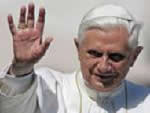|
Pope Benedict XVI- Angelus |
 Angelus
Message
Angelus
Message
On the Peace That Christ Brought
"Not the Simple Absence of Conflict"
H.H. Benedict XVI
August 19, 2007
www.zenit.org
Dear Brothers and Sisters!
There is an expression of Jesusí in this Sundayís Gospel that always
draws our attention and which needs to be properly understood. As he
is on his way to Jerusalem, where death on the cross awaits him,
Christ confides in his disciples: "Do you think that I have come to
establish peace on the earth? No, I tell you, but rather division."
And he adds: "From now on a household of five will be divided, three
against two and two against three; a father will be divided against
his son and a son against his father, a mother against her daughter
and a daughter against her mother, a mother-in-law against her
daughter-in-law and a daughter-in-law against her mother-in-law"
(Luke 12:51-53).
Whoever knows the least amount about the Gospel of Christ knows that
it is the message of peace par excellence; Jesus himself, as St.
Paul writes, "is our peace" (Ephesians 2:14); he died and rose from
the dead to break down the wall of enmity and inaugurated the
Kingdom of God, which is love, joy, and peace.
How, then, are we to explain these words of his? To what is the Lord
referring when he says that he has come to bring -- according to St.
Lukeís redaction -- "division," or -- according to St. Matthewís --
the "sword" (Matthew 10:34)?
Christís expression means the peace that he came to bring is not
synonymous with the simple absence of conflict. On the contrary, the
peace of Jesus is the fruit of a constant struggle against evil. The
battle that Jesus has decided to fight is not against men or human
powers but against the enemy of God and man, Satan.
Those who desire to resist this enemy, remaining faithful to God and
the good, must necessarily deal with misunderstandings and sometimes
very real persecution. Thus, those who intend to follow Jesus and
commit themselves without compromises to the truth must know that
they will face opposition and will become, despite themselves, a
sign of division among persons, even within their own families.
Love of oneís parents is indeed a sacred commandment, but for it to
be lived authentically it cannot be set in opposition to the love of
God and Christ. In such a way, in the footsteps of the Lord Jesus,
Christians must become "instruments of his peace," according to the
celebrated expression of St. Francis of Assisi. This is not an
inconsistent and superficial peace but a real one, pursued with
courage and tenacity in the daily commitment to defeat evil with
good (cf. Romans 12:21), paying in person the price that this
carries with it.
The Virgin Mary, Queen of Peace, shared the struggle of her son
Jesus against the evil one, to the point of spiritual martyrdom, and
she continues to share this struggle until the end of time. Let us
invoke her maternal intercession, that she may help us always to be
faithful witnesses to Christís peace, never giving in to compromises
with evil.
[After the Angelus, the Holy Father said:]
In these days our thoughts and our prayers are turned constantly to
the people of Peru, who have been stricken by a devastating
earthquake. For the many who have died, I invoke the peace of the
Lord, for those who have been injured, I ask for quick recovery, and
for those thrown into miserable circumstances I assure you that the
Church is with you, in spiritual and material solidarity. My
secretary of state, Cardinal Tarcisio Bertone, who for some time had
planned a visit to Peru, in the next few days, will, in person,
bring the testimony of my sentiments and the concrete help of the
Holy See.
This morning in Rimini the "Meeting for Friendship Among Peoples"
opened. The theme of this yearís meeting is "The Truth Is the
Destiny for Which We Have Been Made." In offering a cordial greeting
to the organizers, I give the assurance of my prayers that, through
the multiple initiatives of the program, the meeting might be for
many a profitable occasion for reflection and awareness, to realize
the profoundest vocation of man: being a seeker of truth and thus a
seeker of God (cf. "Fides et Ratio," prologue).
[Translation by ZENIT]
[The Pope then greeted the people in various languages. In English,
he said:]
I am pleased to greet the English-speaking visitors gathered for
this Angelus prayer. The readings from todayís Mass invite us to
lift our eyes to Jesus, who inspires and perfects our faith. May you
and your families experience the Lordís closeness during these
summer holidays and respond to his love through deeper prayer and
more generous acts of charity. Upon all of you I invoke Christís
blessings of joy and peace!
© Copyright 2007 -- Libreria Editrice Vaticana
This page is the work of the Servants of the Pierced Hearts of Jesus and
Mary